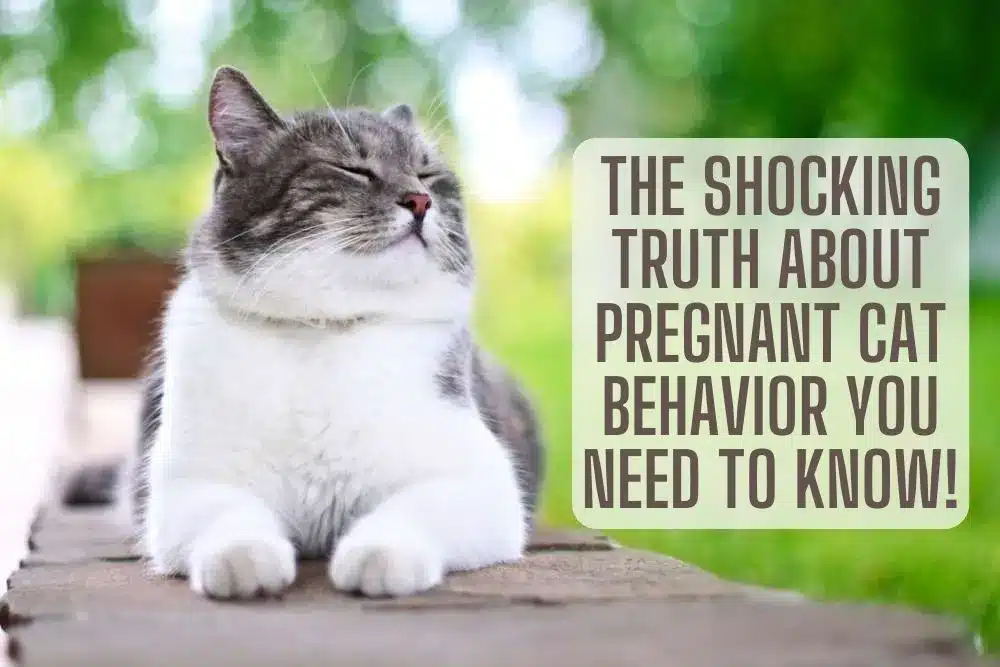If you’re a cat owner, or considering adopting a cat, it’s important to understand their behavior, especially when they’re pregnant. A pregnant cat requires special care and attention, and their behavior can provide important insights into their health and well-being.
That’s why we’ve put together this blog post to help you understand what’s normal and what’s not when it comes to pregnant cat behavior. Whether you’re a seasoned cat owner or a new parent-to-be, we hope this guide will be a valuable resource for you.
The goal of this blog post is to provide you with a comprehensive overview of what to expect from your pregnant cat’s behavior. We’ll cover everything from normal changes in behavior to signs of potential health problems.
Our hope is that by the end of this post, you’ll be better equipped to care for your pregnant cat and provide her with the love and attention she needs during this special time in her life.
So, let’s get started and delve into the fascinating world of pregnant cat behavior!
What to Expect: Normal Pregnant Cat Behavior
Now that you understand the importance of understanding your pregnant cat’s behavior, let’s talk about what’s considered normal. Here are some of the most common behavior changes you can expect from your pregnant feline friend:
1. Changes in Appetite and Thirst
It’s common for pregnant cats to experience changes in their appetite and thirst. Some may eat more frequently, while others may eat less overall. You may also notice your cat drinking more water than usual. This is normal, but it’s important to keep an eye on their food and water intake to ensure they’re getting the nutrition they need.
2. Increase in Sleeping and Resting
Pregnant cats often need more sleep and rest than usual. They may sleep for longer periods throughout the day and night, and may seem less active overall. This is a natural response to the physical demands of pregnancy, and it’s important to provide your cat with a comfortable and quiet place to rest.
3. Nesting Behavior
One of the most exciting changes you may notice in your pregnant cat’s behavior is nesting. This is when your cat starts to create a cozy and safe space for her upcoming litter. Your cat may start to gather blankets and other soft materials to create a nest, or may seek out quiet and secluded spaces to give birth.
4. Changes in Vocalization
As your cat’s pregnancy progresses, you may notice changes in her vocalization. Some cats become more vocal and may meow or purr more often than usual. Others may become quieter and more reserved. These changes are normal and maybe a way for your cat to communicate her needs or discomfort.
5. Increase in Affectionate Behavior
Lastly, you may notice your pregnant cat becoming more affectionate than usual. She may seek out more attention and cuddles from you or may rub against your legs more frequently. This is a natural response to the hormonal changes in her body, and it’s important to provide her with the love and attention she needs during this time.
Overall, these changes in behavior are normal and should be expected during your cat’s pregnancy. However, it’s important to keep an eye on any changes that seem unusual or concerning, and to seek veterinary care if you have any concerns about your cat’s health.
When to be Concerned: Abnormal Pregnant Cat Behavior
While some changes in behavior are to be expected during your cat’s pregnancy, there are certain behaviors that may indicate a problem. Here are some abnormal behaviors to watch out for:
1. Signs of Stress or Anxiety
Pregnant cats can experience stress or anxiety, just like humans. Some common signs of stress or anxiety in cats include hiding, excessive grooming, urinating outside of the litter box, or becoming more aggressive. If you notice any of these behaviors, it’s important to try to identify the cause of the stress and provide a safe and comfortable environment for your cat.
2. Aggressive Behavior
While some pregnant cats may become more affectionate, others may become more aggressive. This can be due to hormonal changes, stress, or discomfort. If your cat is displaying aggressive behavior, it’s important to take steps to keep yourself and others safe, such as keeping your cat separated from other pets or family members.
3. Refusal to Eat or Drink
If your pregnant cat suddenly stops eating or drinking, it could be a sign of a health problem. This could be due to a variety of reasons, such as dental issues, gastrointestinal problems, or kidney disease. If you notice a sudden change in your cat’s appetite or thirst, it’s important to consult with your veterinarian as soon as possible.
4. Excessive Panting or Vocalization
If your pregnant cat is panting excessively or making unusual vocalizations, it could be a sign of pain or discomfort. This could be due to a variety of reasons, such as labor, infection, or injury. If you notice any unusual breathing patterns or sounds, or excessive vocalization, it’s important to seek veterinary care immediately.
Overall, it’s important to pay close attention to your pregnant cat’s behavior and take note of any changes or unusual behaviors. While some changes are normal, others may indicate a problem that requires veterinary care. By being aware of the signs of abnormal behavior, you can ensure that your cat stays healthy and comfortable throughout her pregnancy.
Understanding The Reason Behind Unusual Behavior in Pregnant Cats
If you observe abnormal behavior in your pregnant cat, it’s important to understand the underlying reasons. Here are some possible explanations:
a. Health Issues that may Affect a Pregnant Cat’s Behavior
- Infections: Pregnant cats are susceptible to infections, and these can cause unusual behavior such as lethargy, decreased appetite, and fever.
- Complications during pregnancy: Complications such as miscarriage or difficult labor can lead to behavioral changes in a pregnant cat.
- Pain: If your cat is experiencing pain due to a medical condition, it may exhibit abnormal behavior such as aggression or refusal to eat.
b. Environmental Factors that can Impact a Cat’s Behavior
- Change in routine: Pregnant cats are creatures of habit and changes in their daily routine can cause stress, anxiety, and unusual behavior.
Loud noises: Loud noises such as thunderstorms or construction work can cause a pregnant cat to become anxious or frightened. - Lack of stimulation: A lack of environmental stimulation can lead to boredom, depression, and unusual behavior in pregnant cats.
c. The Role of Hormones in Pregnant Cat Behavior
Hormones play a crucial role in a pregnant cat’s behavior. During pregnancy, a cat’s body produces hormones such as progesterone and estrogen, which can cause changes in behavior such as nesting behavior, increased affection, and vocalization. However, hormonal imbalances can also cause unusual behavior in pregnant cats.
Understanding the reasons behind unusual behavior in your pregnant cat can help you provide the necessary care and support. If you notice any abnormal behavior, it’s best to consult your veterinarian to rule out any underlying health issues.
What to do if you notice unusual behavior in your pregnant cat
If you notice any unusual behavior in your pregnant cat, it’s important to take action quickly. Here are some tips on what to do:
a. When to contact a veterinarian
If your pregnant cat is displaying any of the abnormal behavior signs we discussed earlier or if you have any concerns about their health, it’s important to contact your veterinarian. They can help you determine if the behavior is normal or if there is an underlying health issue.
b. Tips for creating a comfortable environment for a pregnant cat
Creating a comfortable environment for your pregnant cat can help reduce stress and encourage normal behavior. Here are some tips:
- Provide a quiet, private space for your cat to rest and sleep.
- Ensure your cat has access to clean water and food at all times.
- Use litter boxes that are easy for your cat to access and keep them clean.
- Avoid sudden loud noises or disruptions in their environment.
Understanding when behavior changes are normal and when they are cause for concern
It’s important to be able to distinguish between normal behavior changes during pregnancy and behavior changes that may indicate a health issue. Keep an eye out for any changes in appetite, energy levels, or behavior, and don’t hesitate to contact your veterinarian if you have any concerns.
Understanding your pregnant cat’s behavior is crucial for ensuring their health and well-being. By recognizing normal and abnormal behavior patterns and taking appropriate action, you can help your cat have a safe and healthy pregnancy.
Conclusion
Understanding your pregnant cat’s behavior is crucial in ensuring their health and well-being. Knowing what to expect and how to identify unusual behavior can help you provide the best care for your feline friend during this important time.
Here are some key takeaways:
- Normal behavior changes in a pregnant cat include changes in appetite, sleeping patterns, nesting behavior, vocalization, and increased affection.
- Abnormal behavior, such as aggression or refusal to eat or drink, can indicate health issues or environmental stressors.
- Understanding the reasons behind unusual behavior, including health issues and hormones, can help you address the problem and ensure your cat’s comfort.
- If you notice unusual behavior in your pregnant cat, contact a veterinarian for guidance and advice.
- Creating a comfortable environment for your cat, providing proper nutrition, and monitoring their behavior can help ensure a safe and healthy pregnancy.
Remember, taking care of a pregnant cat can be challenging, but it can also be a rewarding experience. By understanding your cat’s behavior and providing them with the care they need, you can help ensure a safe and healthy pregnancy and delivery.












